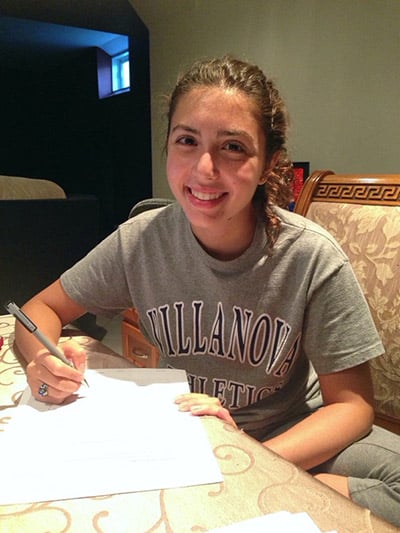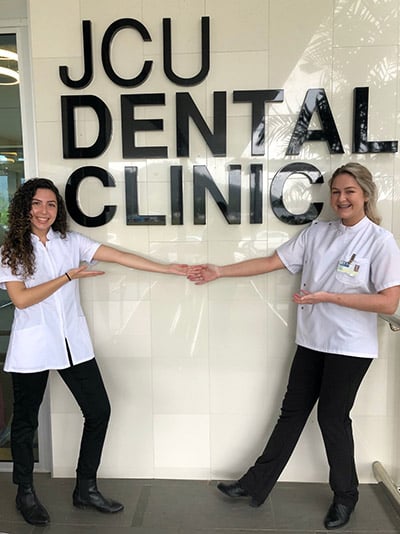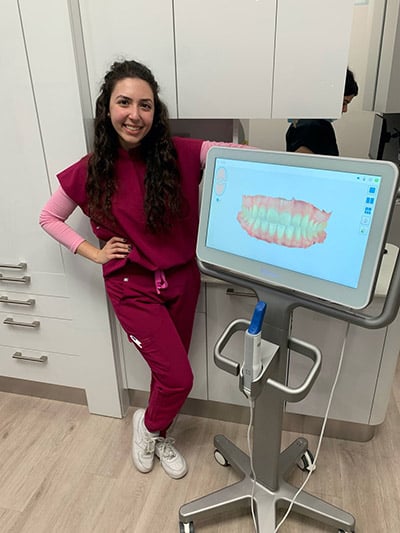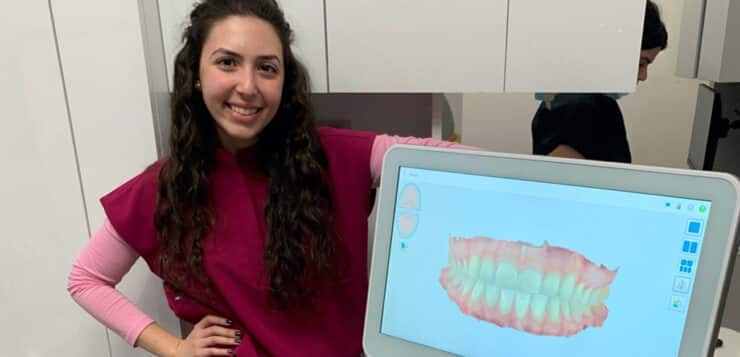A James Cook University Dental School Graduate Shares Her Story
Aspiring dentists, meet Dr. Cristina Galloro, a dentist based in Toronto, Ontario.
She was just named one of the Top 20 Dentists to Look Out for in 2021, so we thought it was time to reach out to the former OzTREKK student to see how she got there!

Tell us a little bit about yourself
My name is Dr. Cristina Galloro, and I am a graduate of the Bachelor of Dental Surgery (BDS) program at James Cook University (JCU), class of 2019. I will never regret my choice to study in Australia as it was a life-changing whirlwind experience.
I still remember the first phone call we had—myself, a member of the OzTREKK team, and my mother—when I was in Grade 9 after I had found out about Australian dental programs. The call ended with my mom very firmly telling me that she would only agree to accompany me to an Australian university fair if I pulled the plug on the idea and promised never to mention it again. However, once at the fair, she saw the excitement in my eyes and knew, much to her dismay, that she was about to lose her only daughter to Australia.
With the help of OzTREKK, I applied to, interviewed with, and got accepted to JCU’s Bachelor of Dental Surgery program in the summer of 2014. From that point onwards, my life pretty much centered on preparing myself for the big move. Team members from OzTREKK put me in touch with current students at JCU who helped to answer my questions about accommodation and what it was like studying/living in Australia. I also tried my best to research what I could expect regarding the culture and climate in Far North Queensland (FNQ).
Making the move to Australia
I moved to Cairns, Queensland, Australia in February 2015. I still remember getting off the plane and being hit with the most intense heat and humidity I had ever experienced (little did I know it gets worse). Living in FNQ is an experience like no other. The people are kind, welcoming, and generous—it just takes a little while to understand what they are saying. Australians are well-known for their colloquial terms and the more rural you go the more interesting they become.
Arvo – Afternoon
Boot – Trunk of a car
Bottle-O/Bottle Shop – Liquor store
Chook – A chicken
Oi – A form of getting a friend’s attention, like saying “Hey!”
Servo – Gas station
Ta – Thanks
Thongs – Flip-flops
Know that it will take some time to get used to their idiosyncrasies and you will most likely never stop learning new terminologies and phrases. My Australian friends still manage to surprise me!

What should you pack?
My best piece of advice for someone moving to Far North Queensland is to buy a small umbrella that you can fit in your bag (and always keep it there) along with a light rain jacket that you can also stuff in there. Wet season is no joke in the tropics, and I have still yet to see downpours like that. In terms of other clothes, I would make sure to bring everyday light and casual clothing for class and a few pairs of nicer pants/shirts for presentations. Once you move into clinical years, you’ll need to expand your professional wardrobe, but in the beginning, I would focus on keeping life simple. You also won’t need thick jackets, coats, or boots, so save yourself the time and baggage weight so keep those at home.
It is all a bit scary in the beginning—a new school, new program, new country—but you’ll find that even if it takes some time, you will find friends, a study routine, and a familiar daily routine. You’ll start out in first year wondering how you could ever learn all this information, let alone well enough to oversee someone’s future oral health. School years will fly by quicker than you think, and before you know it, you will be entering clinic and placements.
What to expect during clinicals
Clinic will be nerve-wracking at first, just like anything else that is new. Try to find comfort in knowing that everyone else is also just as scared as you are and the reason that you have supervisors is because you’re not supposed to know everything right now. I always found it helpful to bring a little binder with me to clinic that would have my therapeutic guidelines and quick fact sheets like eruption dates, locations of pulp chambers for each tooth, lists of the different scalers and where to use them—essentially things I could turn to in a pinch. I truthfully believe that one of the most valuable skills I learned in clinic was communication and patient management.
A lot of your time in clinic is spent waiting… waiting to have your preps checked, waiting to have your anesthetic slips signed, waiting for a medical history signoff. You’ll quickly find that sitting in complete silence with your patient during all this waiting time is extremely awkward and a poor way to build patient rapport. Learning to fill this silence with comfortable, easy conversations helps to not only build rapport, but also patient confidence as they feel like they’ve gotten to know you as a person rather than having to sit in silence while you clean their teeth. As a practicing dentist, I have found that many clinicians aren’t able to grasp this skill and if you can, it sets you apart from the rest.
Don’t forget to take care of you
Now, it’s important not to lose yourself in the overwhelming journey that is dental school. Take time to build relationships. Watch movies, have sleepovers with your friends, or a night out on the town. Don’t forget that this time in your life is significant for character development. I truly believe that my experience in dental school shaped me into the person I am today. Don’t get me wrong—I studied very intensely, but I also made time to do things aside from dentistry that I enjoyed. Dentistry programs often have a very communal approach to socializing and there will be student associations that will organize cocktail parties, lunch-and-learns, and other sessions to bring students together, sometimes even with other cohorts like medicine.
Making the most out of your placements
Before you know it, you’ll be in your final year and preparing for placement. At JCU there are multiple placement opportunities in rural and remote areas of Australia and internationally. I had placements at Cairns North Oral Health Centre and the Mareeba Hospital. My placement year gave me my first taste of graduate practice. You’ll have your own full books of patients, sometimes up to 15 a day! Not to mention you may be responsible for helping your fellow colleagues if they run late or need to squeeze in an emergency patient. As you get more and more confident and clinically competent, your supervisors will ease off, sometimes even allowing you to treat patients autonomously. Take this opportunity to ask as many questions as you can think of. Don’t be afraid to make mistakes. This is the best place to do it! You are practicing in a safe, controlled environment that doesn’t exist for anyone after dental school. Make good use of this opportunity.

Practicing in Canada: studying for your board exams and setting up your clinic
If you are planning to return to Canada after graduating from dental school, you will also likely be studying for your Canadian board exams during your final year. This can make life stressful, and you often won’t be having the same kind of freedom as your Australian counterparts. This two-day examination can be taken in Australia or back home in Canada and often depends on what works best with your final-year dental school exam schedule.
Once you finish your dental school exams and Canadian board exams, you’ll spend the next few weeks/months waiting for your results. My best advice during this time is not to think about or talk about the board exams. Go on with life as usual and you’ll hear from the examining board when you hear from them. If you’re successful, you’ll spend the next few weeks waiting for your registration in your respective province or territory. Until you receive your registration, you are not yet licensed to practice in Canada. Assuming you already have a position lined up, take this much deserved time off to rest. This is pretty much the only time in your life that you have nothing to study, no patients to attend, and very few life responsibilities.
After graduation I chose to go into private practice by purchasing two existing dental practices from a retiring principal dentist. This was no easy feat, but now, nearly two years later, I can say it was one of the best decisions I have ever made. It will take some time to adjust to life in private practice especially if, like myself, you have only worked in public health. You’ll learn a lot about managing several patients at a time, hygiene recalls, treatment planning and dealing with insurance companies. Try to surround yourself with supportive colleagues, and most important, a good mentor. A strong mentor can mean all the difference. If you’re lucky, you’ll find more than one. For myself, my mentors included my administrative staff, my hygienists, my assistants, my associates, and my equipment suppliers… just to name a few. I have found that people place a lot of importance on a mentor being another dentist. While this is priceless, you’ll find that sometimes a strong hygienist who started practicing when you still had baby teeth will have a lot of valuable insight and is worthwhile listening to.
#1 Tip
The most important piece of advice I can give to any new graduate is to never lose sight of your first-year self. Remember all the feelings you have now: fear, the desire to do well, and most important, humility. As doctors, it is easy to get wrapped up in the title and false sense of self-importance that comes along with it. Continue to treat everyone, regardless of title or position, with the kindness and respect they deserve. Beyond all else, stay humble.
I wish you all the best of luck, wherever life may take you.
Sincerely yours,
Dr. Cristina Vincenza Galloro, BDS
Contributed by
Julie Reynolds, OzTREKK educational services
oztrekk.com








Discussion1 Comment
Thanks for the information.